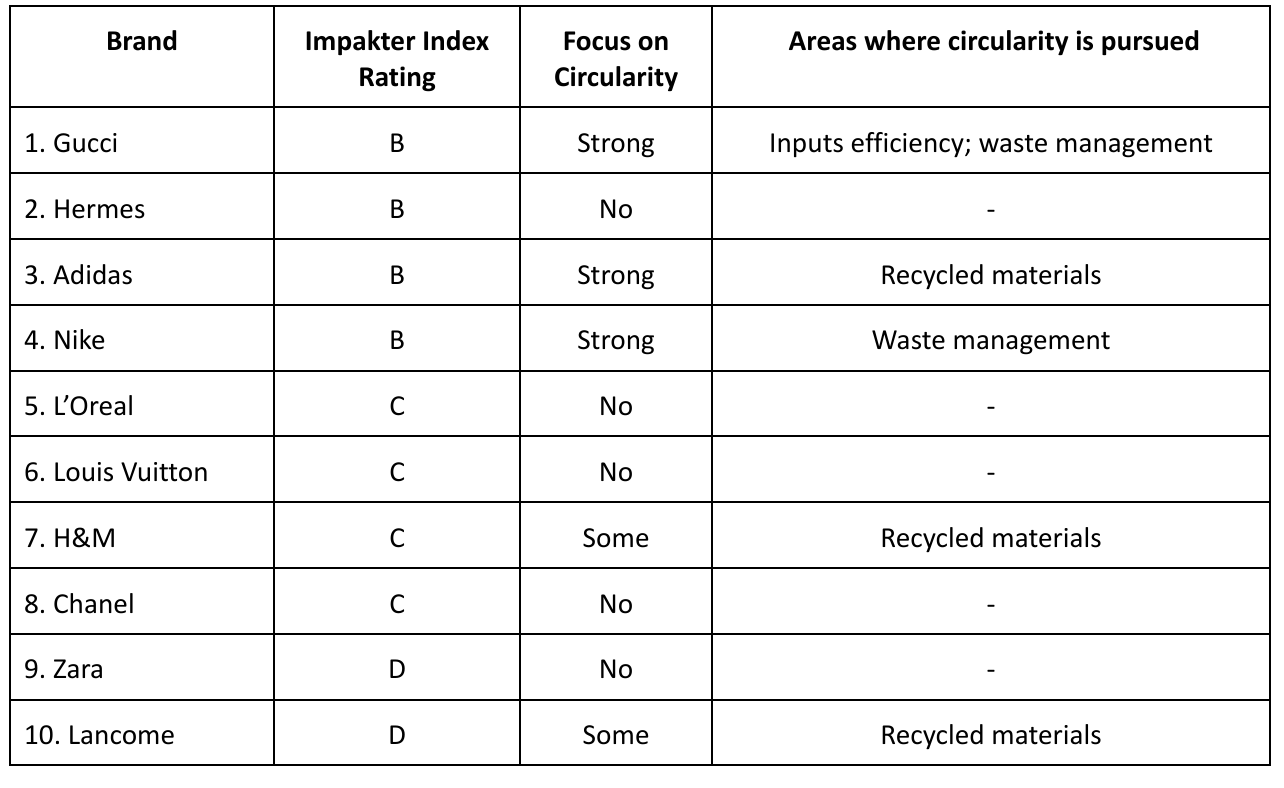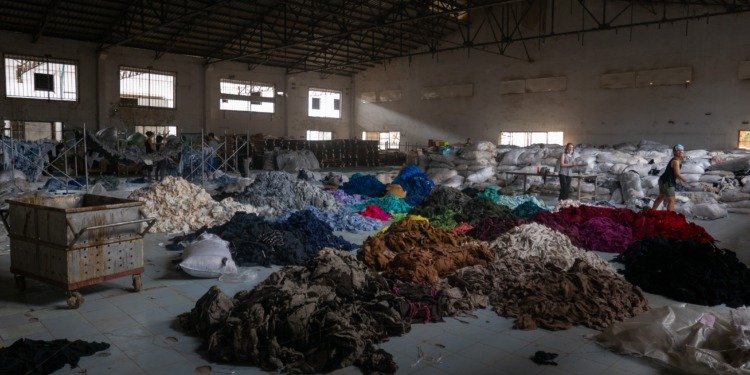Circularity in the fashion industry is defined as processes that “close the loop on production, including responsible manufacturing, use, and end-of-life for every garment.” The apparel industry’s growing conversation around circularity has had brands and consumers alike tackling ways to dramatically decrease the waste and pollution from a notoriously wasteful industry.
The recently published Impakter Index Fashion and Beautycare Report ranked some of the world’s biggest names in fashion and beauty. The report provided useful pointers toward an answer to two major questions:
- How feasible is it for the fashion industry to achieve circularity?
- How seriously do brands take circularity?
Sustainable fashion features many components. What kind of materials will optimize eco-friendliness? What production practices will eat up the least amount of resources? How can leftover resources be reused to avoid waste and pollution?
Circularity is a broad concept that provides the framework for which fashion brands can turn their production practices into a “cycle” of reuse, and regeneration, and gives new life to a material or product that previously would have been tossed into a landfill.
While the report covered only 10 brands, these global brands can provide helpful insight into circularity’s current role in the fashion industry, and what can be expected of the process in the future.
Highlights of the Impakter Index Report on 10 Top Global Fashion and Beauty Care Brands (2023)

As the above table suggests, there is a dynamic correlation between a strong focus on adopting circular methods of production – whether using natural inputs (such as water) in the production process or recycled materials for the product – and good results in terms of sustainability.
The brands that rely the most on a circular approach in their operations are those that rank highest on the Impakter Index – and Gucci stands out: while it ranks highest on the report, their production leans closer toward overall sustainability versus circularity in particular (it adheres to worker welfare, decent wages and gender equality in addition to the process of reintegrating recycled materials in production).
According to the report, Gucci ranked first in terms of overall transparency, credibility, and sustainability. This also includes circularity; Gucci brings a full loop into production by acting on the goals they set to achieve in their Environmental Profit and Loss Report. Gucci embraces circularity’s cycle approach to production; through regenerating nature after extracting its resources during material sourcing, Gucci does not let any waste go unused back into the cycle.
Conserving 9.5 million liters of water and eliminating 253 tons of leather scrap waste are some ways Gucci has lessened its overall output impact and contributed to circularity’s waste- and pollution-reducing cycle.
Examples of brands that embrace circularity in its literal sense (materials and resources reused in a circular, cycle-like production that results in minimized waste) are Adidas and Nike. These sports brands embrace circularity in the way that their manufacturing process relies heavily on recycling. Recycling and conserving water, powering factory operations with renewable, solar energy, and recycling materials such as leather and fiber scraps left over from production directly back into new lines and collections make these two brands part of circularity in the fashion industry.
Among the laggards, two stand out: H&M and Lancome. Both have included circularity among their goals to achieve sustainability – and success is likely to very much depend on how serious they are in pursuing their goals. While these goals have, in fact, been outlined, little progress has been found according to the report. Because of this, they rank lowest in terms of circularity; once their commitment to recycling in the production process becomes traceable (to be included in a future updated report), then these brands can be included under the circularity umbrella.
How feasible is circularity in fashion?
Considering this global high fashion brand’s success in circularity practices, Gucci has proven that circularity in the apparel industry (across all sectors) is certainly feasible. Important certifications, proper research, and real action pave a smoother way for this to be achieved; the bigger the brand, the better access there is to resources.
Upcycling has also allowed brands to transform waste into new products. For example, the fashion brand Byborre has created a line of clothing made from recycled plastic bottles, and the luxury brand Louis Vuitton has collaborated with the artist Urs Fischer to create upcycled bags made from damaged leather goods. Closed-loop systems allow the brand to reuse scrap materials from products in order to create new ones. Adidas’ own closed-loop system, “Loop,” enables the brand to reuse materials leftover from production to create new shoes.
How seriously do brands consider circularity?
Given that other enormous brands like Hermes and Adidas come in close to Gucci on the Index report, it can be argued that brands are serious about achieving cleaner production practices through the values of circularity that relate to all levels of the manufacturing chain. Renewable energy, recycling resources back into the supply chain, and waste reduction are some keywords that highlight circularity.
Moreover Nike, in achieving these factors (recycling 69% of waste, 64% of renewable energy, and 97% waste diversion from landfills) demonstrates the way that there are plenty of brands that consider circularity as important to their identities.
However, some major brands, like H&M and Lancome appear to be still not considering circularity as seriously as they should (H&M) or not at all (Lancome) and that is a matter of concern. But, as shown by the in-depth analysis on H&M carried out by the Impakter Index team, all hope is not lost, lessons are being learned, and sustainability is likely to be achieved if management stops “greenwashing” and seriously pursues sustainability.
Editor’s Note: The opinions expressed here by the authors are their own, not those of Impakter.com — In the Featured Photo: A textile factory floor. Featured Photo Credit: Francois Le Nguyen.










